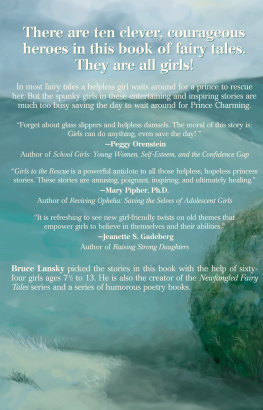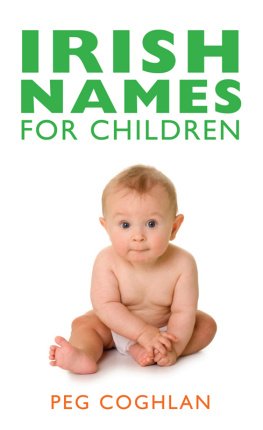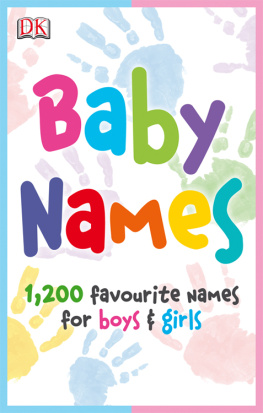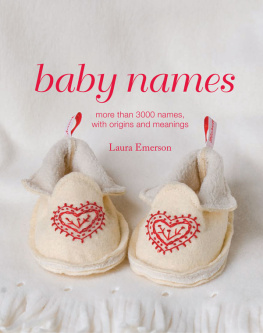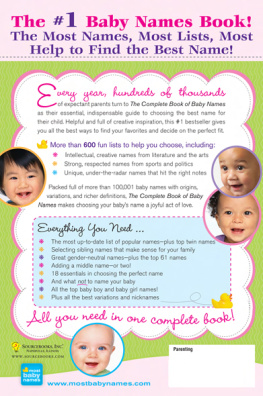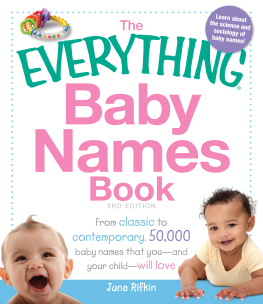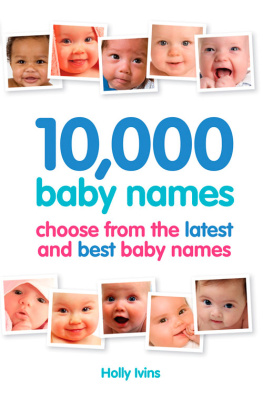Contents
Introduction
Searching for just the right name for your baby can be a pleasure if you have just the right book. Let me tell you why I think 60,000+ Baby Names is the right book. It contains the most namescomplete with origins, meanings, variations, fascinating facts, and famous namesakesof any book in its price range. Here youll find the most names from major ethnic origins, such as: Nearly 7,000 American names, many of which African-American families choose for their children Over 5,000 names Hispanic families commonly use Over 4,000 French names; 9,000 English names; 6,000 Latin names; 4,000 Irish names; and 6,000 Greek names Nearly 6,000 Hebrew names; 2,500 Arabic names; and 4,000 German names Thousands of Scottish, Welsh, Italian, Russian, Scandinavian, Chinese, Japanese, Polish, Native American, Hawaiian, African, and Hindi names. But theres more in 60,000+ Baby Names than just pages and pages of names. There are also over 200 fun, helpful lists that will get you brainstorming names without having to read the book cover to cover.
If youre interested in tracking names over the years or just looking for a timeless name, youll love the lists of popular names over the last one hundred years. Want to know what parents in Canada, Australia, Sweden, and Japan are naming their babies? Want to find that perfect name to reflect your heritage? 60,000+ Baby Names features lists of popular names around the world as well as lists of common and interesting names from many different origins. Want to name your baby after your favorite movie star, religious figure, or locale? Check out the lists featuring names inspired by people, places, and things. These lists will get you thinking about names that have special meaning to you. Dont miss How to Pick a Name You and Your Baby Will Love. In three simple steps, complete with easy-to-use worksheets, you can select a name that has personal meaning but is also practical.
Its the perfect approach for parents who find the idea of reading over 60,000 baby names a bit overwhelming. 60,000+ Baby Names also has an exclusive new feature to help parents make informed choices about names. Recently, naming trends have been heading in less traditional directions. One such trend is to use traditional boys names for girls and vice versa. Throughout the Girls Names and Boys Names sections, youll find special icons highlighting names that are shared by both sexes. The icons will indicate whether a shared name is used mostly for boys B , used mostly for girls G , or used about evenly by both sexes BG .
Some parents want androgynous or gender-jumping names and other parents want names with clear gender identification. Either way, the icons will help you make an informed choice. As you browse the names with these special icons, you may be surprised to learn that certain names are shared. Its important to keep several factors in mind: 1. The data may include errors. Amanda is listed in the boys section because records show that 1 out of every 100,000 boys are named Amanda.
Its reasonable to think that some boy Amandas are simply recording errors, but perhaps some arent. 2. Names have different roles in different cultures. In the U.S., Andrea is primarily a girls name, whereas in Italy, its often used as a boys name (for example, opera star Andrea Bocelli). 3. This book defines a name by its spelling, not by its pronunciation or meaning.
This explains why a name like Julian is listed as a shared name. Julian (pronounced JOO-lee-en) is a form of Julius, and therefore in the Boys Names section. Julian (pronounced Joo-lee-ANN) is a form of Julianne, and therefore in the Girls Names section. You could argue that these are two different names, but because this book defines a name by its spelling, it treats them as one name. 4. The gender assignment of names changeoften in surprising ways.
For years, Ashley was used often for boys. (Remember Ashley Wilkes in Gone with the Wind?) Twenty-five years ago, it was in the top 300 of boys names. Today it doesnt crack the top 1,000. In 2000, over twice as many boys than girls were named Reese. By 2004, actress Reese Witherspoon had helped those numbers switch placesnow nearly twice as many girls than boys are named Reese. 
How to Pick a Name You and Your Baby Will Like
The first edition of The Best Baby Name Book in the Whole Wide World, which I wrote back in 1978, had about 10,000 names on 120 pages.

How to Pick a Name You and Your Baby Will Like
The first edition of The Best Baby Name Book in the Whole Wide World, which I wrote back in 1978, had about 10,000 names on 120 pages.
So, you could read the introductory material about 15 Things to Consider When You Name Your Baby and browse all the main listings (and even pause to read the origins, meanings, and variations for names that appealed to you) in a few hours. Its something a couple could even do together. 60,000+ Baby Names has, of course, more than 60,000 names on nearly 700 pages. I dont know how long it would take you and your partner to browse all the main listings and pause to read more about your favorites, but it could be a daunting task. If youre up to the challenge, go for it. Youll certainly find your favorite names and discover some new names as well.
But if the idea of wading through a sea of 60,000 names sounds overwhelming, Id like to propose another method. The method I suggest involves generating lists of names you and your partner love and then narrowing down the lists based on how well the names might work for your baby. Its a fun, easy way to come up with a name that has special meaning but is practical as well. Lets get started.
Step 1: Make a List of Names with Special Meaning
Make a list of names to consider by writing down your answers to the following questions. (You can each make your own list.) These questions are based on the lists starting on .
Browse those lists to help you answer the questions and to brainstorm other questions specific to your background, preferences, and experiences.
What are your favorite names from the lists of most popular names over the past 100 years? If any of your relatives names appear in the popularity lists from previous generations, what are your favorites?
What country are your parents or grandparents from? What country are you and your partner from? If any of your relatives names appear in the international lists, what are your favorites? What are your favorite names that are currently popular in other countries? What language(s) do you speak? Where did you go on your honeymoon? Where do you like to vacation? Where did you conceive?
What might your babys personality be like? How might your baby look physically? What impression would you like your babys name to make about him/her?
Who are your favorite artists? Who are your favorite athletes? Who are your favorite musicians? Who are your favorite movie stars? Who are your favorite authors? Who are your favorite fictional, biblical, and mythological characters? Who are your favorite presidents and military figures? What are your favorite flowers? What are your favorite gems? What are your favorite aspects of nature? Once you answer these questions, turn to the Girls Names and Boys Names sections to find interesting spellings or variations based on the names from your list. (As you flip through the book, you might stumble across a few new names that capture your attention, too.) That will give you a long list of names to consider for the next step.


